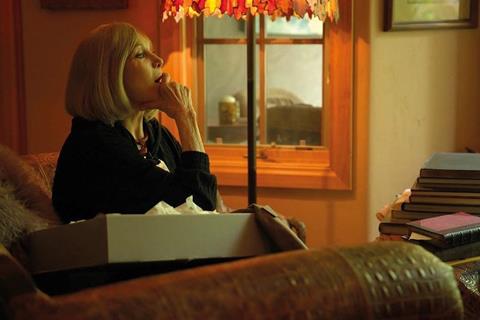Director Alexandre O’ Philippe joins Novak for a look back at her career, and her most famous role

Dir: Alexandre O. Philippe. USA. 2025. 76mins
“I needed to know that I was authentic”, says Kim Novak at one point in Alexandre O. Philippe’s affectionately revealing documentary about an actress who turned her back on Hollywood at the height of her career. That phrase could serve as the logline for a film that is both the celebration of a remarkable woman and an attempt to connect the actress with her most iconic role – that of Judy in Alfred Hitchcock’s Vertigo. It feels at times like a kind of exorcism, as the 92-year-old Novak grapples with the ghosts of the past – given prominent visual form here in the grey suit Hitchcock famously forced her to wear in the film, which she is seen handling for the first time in over half a century.
Engaging, fluid portrait of an inspiring woman
Philippe is something of a specialist in cinematic afterlives. Perhaps the best-known example is The People vs George Lucas, his 2010 study of Star Wars fandom, but he has also touched on Hitchcock before in 78/52, which milked the shower scene in Psycho, and its cultural fallout, for 90 absorbing minutes. Kim Novak’s Vertigo doesn’t possess quite the ‘cineaste rabbit hole’ fascination of that film, or the director’s last, Lynch/Oz (2022). But it does have the warm glow that emanates from its subject, whose reputation as an uncommunicative recluse is ripped up in a documentary that shows her to be feisty, funny and articulate, not to mention a perceptive critic of her own work. Limited theatrical action in major cities is a possibility following the film’s Venice premiere, but it seems more likely that it will find a home on streaming.
Early on it feels like we’re in a pretty conventional talking-over-family-photos documentary that starts with its protagonist’s childhood. Novak is glimpsed here in her self-designed house in Oregon, hanging out with a menagerie of pets, and communing with Philippe, who explains that his own obsession with cinema began when he spotted the wallpaper from his family home in a famous scene from Vertigo. Things get more interesting when Novak starts to talk about the kinship she has always felt with Greta Garbo – due to what she identifies as a shared vulnerability, and the ability to harness it as a strength.
It’s around a third of the way in that this concise documentary really takes a hold of us. Today, Novak is something of a feminist icon, an actress who fought long and hard against her billing as the latest sultry studio blonde, and she owns this reframing. “It was powerful leaving Hollywood – it was liberating,” she asserts, while railing elegantly against misogynist, racist Hollywood patriarchs like Harry Cohn, her boss at Columbia, who called her ‘the fat Polack’.
Over well-chosen clips from many of the movies she made under contract to Columbia in the 1950s, the actress talks unguardedly about her feeling that the system was trying to mould her into something she was not; not least because they made her change her name from Marilyn to Kim. What a great springboard for a discussion of Judy, her ‘double’ character in Vertigo – and neither Philippe nor Novak fluff the chance. It’s fascinating to watch, in split screen, as the actress talks us through Judy’s inner thoughts as she walks towards the smothering embrace of Jimmy Stewart’s Scottie, or hear her open up about how the role caused her to suffer a kind of identity vertigo; one that became clearer to her in later years when she was diagnosed as bipolar.
With its soft shallow focus effects that give Novak even more of an aura than she already possesses and its gentle solo piano soundtrack, Philippe’s latest documentary foray has some sentimental moments that stop just short of twee. A final love-in scene that shows the actress praising the director for helping her to appreciate herself doesn’t feel like an essential inclusion. Philippe’s admiration for his subject is there, after all, in every frame of his engaging, fluid portrait of an inspiring woman.
Production company: Gull House Films
International sales: Dogwoof, sales@dogwoof.com
Producer: Terri Pinon
Cinematography: Robert Muratore
Editing: David Lawrence
Music: Jon Hegel
























